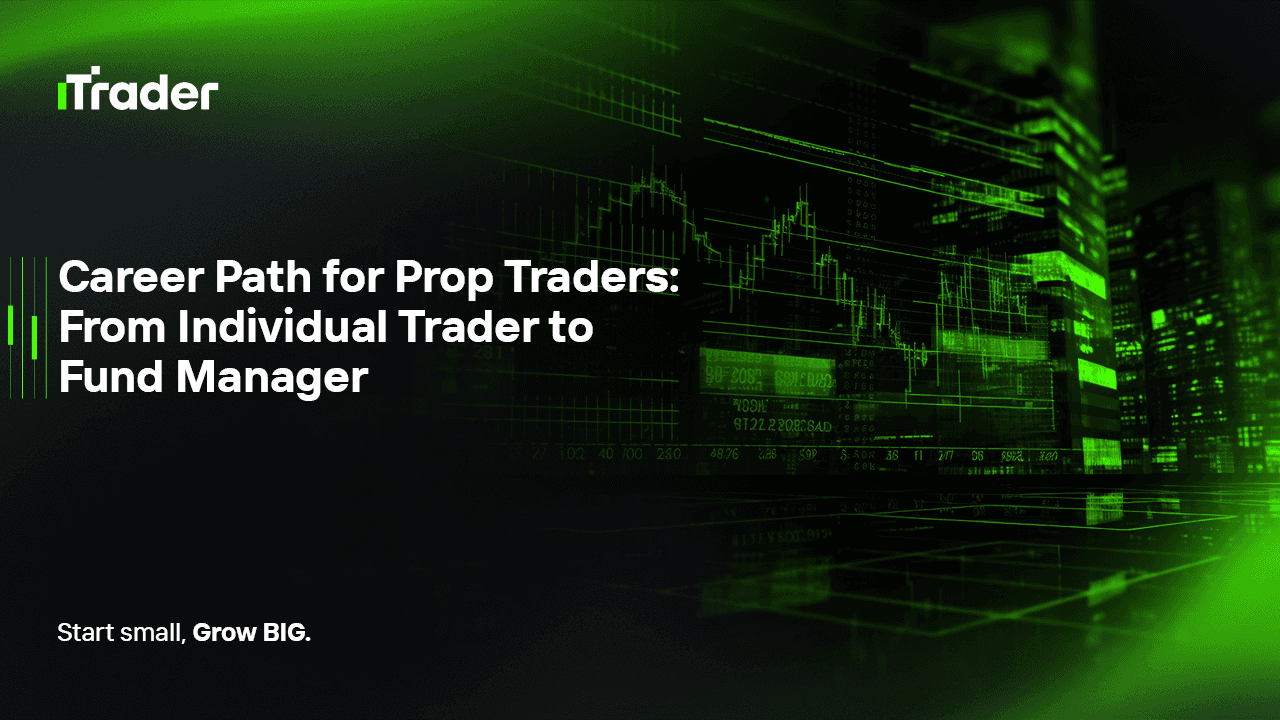2025-09-19
In the world of forex and financial markets, becoming a prop trader is a dream for many. Passing a prop firm’s evaluation and gaining access to capital without risking personal funds is a huge milestone. Yet, this is not the endpoint. On the contrary—it marks the beginning of a much broader career trajectory, where an independent trader can evolve into a portfolio manager and, ultimately, an asset manager.

This blog explores the career path of prop traders across five major stages, highlighting the goals, skills, and challenges at each level, as well as the future trends shaping this journey.
At this stage, discipline is everything. While strategy, indicators, and technical knowledge matter, they are never enough on their own. The real test lies in the psychological ability to accept losses.
Most traders fail prop evaluations due to over-leverage or impatience. This stage is essentially survival school—learning how to last long enough to build consistency.
Once an independent trader shows stable profitability, they often gain access to larger allocations within the prop firm. At this stage, the goal shifts from mere survival to institutional-grade performance.
Many traders at this stage sabotage themselves by trying to expand too quickly—juggling too many strategies at once and destabilizing their equity curve.
As advanced traders mature, they often begin collaborating with peers. At this stage, traders focus not only on their personal performance but also on contributing to a team or “strategy desk.”
Trust, transparency, and communication become central. A trader must respect not only their own discipline but also the team’s collective approach.
This stage represents a major career transition. Moving beyond prop firm capital, traders can attract external investors if they prove consistent performance.
The biggest obstacle is bridging the gap between personal trading style and institutional standards. For investors, profitability matters—but long-term stability and risk control matter even more.
The final stage is reaching the level of an asset manager. At this point, the trader is no longer just an operator but becomes a business owner managing capital at scale.
At this level, success requires a balance of technical expertise, business acumen, and interpersonal skills—a demanding combination that separates professionals from amateurs.
The career of a prop trader does not end with passing a firm’s evaluation. It is the beginning of a multi-stage progression:
At every stage, the keys remain the same: discipline, transparency, and reputation. With these, any trader can evolve from trading a small account to managing millions in investor capital.
2025 Ай Трейдер Глобал ХХК | Компанийн бүртгэлийн дугаар: 15962
Ай Трейдер Глобал ХХК нь Комор улсын Анжуан арал дахь Мутсамуду хотын Хамчакод байрлалтай. Тус компани нь Коморын Үнэт Цаасны Хорооноос (Securities Commission of the Comoros) олгосон L15962/ITGL дугаартай тусгай зөвшөөрлийн хүрээнд үйл ажиллагаа явуулдаг.
Ай Трейдер Глобал ХХК нь “iTrader” нэрийн дор үйл ажиллагаа явуулдаг бөгөөд (Форекс) арилжааны үйл ажиллагаа явуулах эрхтэй. Компанийн лого, барааны тэмдэг, вэбсайт нь зөвхөн Ай Трейдер Глобал ХХК компанийн өмч юм.
Ай Трейдер Глобал ХХК -ийн охин компани болох : iTrader Global Pty Ltd, Австралийн компанийн бүртгэлийн дугаар (ACN): 686 857 198. Энэ компани нь Opheleo Holdings Pty Ltd компанийн албан ёсны төлөөлөгч бөгөөд Австралийн санхүүгийн үйлчилгээний төлөөлөгчийн дугаар: 001315037 -тай. Австралийн санхүүгийн үйлчилгээний лицензийн дугаар: 000224485 -тай Level 1, 256 Rundle St, Adelaide, SA 5000 хаягт байршдаг. Анхааруулга: Энэ байгууллага нь энэхүү вэбсайт дээр болон дамжуулан арилжаалагдаж буй санхүүгийн (арилжааны) хэрэгсэл нийлүүлэгч биш бөгөөд ямар нэгэн хариуцлага хүлээхгүй болно.
Эрсдэлийн сэрэмжлүүлэг: CFD арилжааны хөшүүргийн улмаас хөрөнгөө хурдан алдах өндөр эрсдэлтэй тул бүх хэрэглэгчдэд тохиромжгүй байдаг.
Фанд, CFD болон бусад өндөр xөшүүрэгтэй арилжаа нь хэрэглэгчээс нарийн төвөгтэй ойлголтуудын талаар тусгай мэдлэг шаарддаг. Хөшүүрэгтэй арилжаанд оролцогчдын 84.01% нь алдагдал хүлээдгийг судалгаанууд харуулдаг тул хөшүүрэгтэй арилжаанд орохоос өмнө хөрөнгөө алдах маш өндөр эрсдэлтэй болохыг анхаарна уу.
iTrader нь аливаа иргэн, хуулийн этгээдийн өмнө xөшүүрэгтэй арилжааны эрсдэл, алдагдал, бусад хохирлыг бүхэлд нь хариуцахгүй болохыг мэдэгдэж байна.
Энэхүү веб сайтын мэдээ, мэдээлэл нь зөвхөн мэдлэг түгээх зорилготой тул хэрэглэгч та бие даан шийдвэр гаргана уу.
Хязгаарлалт: iTrader нь вэбсайт болон үйлчилгээгээ тухайн орны хууль тогтоомж, дүрэм журмаар хориглосон орнуудад оршин суугчдад чиглүүлдэггүй. Хэрэв та энэхүү вэбсайтыг ашиглахыг хориглосон оронд байгаа бол вэбсайт болон үйлчилгээг ашиглахдаа тухайн орны хууль тогтоомжид нийцэж байгаа эсэхийг шалгах үүрэгтэй. iTrader нь вэбсайтынхаа мэдээлэл бүх оронд тохиромжтой эсэхийг баталгаажуулдаггүй.
Ай Трейдер Глобал ХХК нь зарим улс орны иргэдэд үйлчилгээ үзүүлэхээс татгалздаг болно. Жишээлбэл: АНУ, Орос, Бразил, Канада, Израйл, Иран.